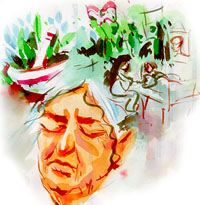Miscellanea/Kamala Das
The freedom struggle gave the youth a chance to become
heroes and heroines
 There are three competent practitioners of allopathic medicine
in my family. They are complacent regarding their ability to diagnose
an illness and embark upon the rightmost treatment for it. I have
had no formal education but, for the pleasure of reading medical
treatises, I have read many. I have listened to the rural folk
talk about herbal cures. When mother had an epileptic seizure
two days ago while eating her supper of rice and a curry made
out of lentils, my sister immediately sucked out the rice stuck
in mother's throat and thumped her chest to revitalise the heart.
There are three competent practitioners of allopathic medicine
in my family. They are complacent regarding their ability to diagnose
an illness and embark upon the rightmost treatment for it. I have
had no formal education but, for the pleasure of reading medical
treatises, I have read many. I have listened to the rural folk
talk about herbal cures. When mother had an epileptic seizure
two days ago while eating her supper of rice and a curry made
out of lentils, my sister immediately sucked out the rice stuck
in mother's throat and thumped her chest to revitalise the heart.
I am embarrassed to talk to allopaths about the cures suggested
by the village healers of my childhood. If an epileptic is made
to clutch a piece of iron in his hand, the seizure is sure to
subside. I cannot convince the doctors that reciting the words
Om Namo Narayana into the patient's ear would help. A few drops
of water in which basil leaves have been soaked would help clear
the air passage. Mother is 87. After her eldest son died in the
wake of an abdominal surgery, she lost her memory. Something akin
to Alzheimer's disease set in. All she could remember afterwards
was the savings account she had at the Canara Bank. She feared
constantly that some wily relative might find a way to misappropriate
it.
Mother was a follower of Mahatma Gandhi right from her 19th year,
which was the time when father married her. Father worked for
a British automobile firm in Calcutta and could not afford to
wear khaddar in public. Therefore he requested mother to abandon
her good muslins and jewels to show the world that she was Gandhian.
Gandhism was fashionable then. It tasted like forbidden fruit.
The freedom fighters knew that they might have to face lathi charges
and imprisonment. Every youth needs a cause to fight for, a chance
to appear noble in other's eyes. The freedom struggle gave them
a chance to become heroes and heroines.
Mother did not require coarse, homespun khaddar to turn herself
into a role model. She wrote poetry. She wrote before India attained
her freedom. She wrote after India became free. Freedom was a
word bandied about, a word they cradled tenderly on their tongues.
Indians took freedom with a great deal of surprise. The British
too were surprised. There was a period of numbness when even thinking
of it was not an easy feat. To this day I do not know how the
British reconciled themselves to the loss of the Empire. They
must regret the 'noblesse oblige' policy they adopted when Mahatma
Gandhi and his vast following carried it off with élan.
Mother wrote poetry, lying on her tummy on the four poster that
was as big as a standard bedroom. We lived in a large apartment
above the showroom of the Walfords Transport Company Ltd at 117
Park Street. It was close to the European cemetery where marigolds
bloomed and bougainvillea climbed the minarets of graves. As children,
my brother and I played around in the cemetery and read the inscriptions
on the old tombstones.
Both mother and father were busy people and talked little with
us. Mother had had a few epileptic fits when we were children.
But now, after a long span of quiet years, she was getting them
again. Her body grew stiff. Her face turned blue. Her feet grew
very cold. Was she dying, I wondered? We were at a loss all of
a sudden. Once upon a time, there were experts in our village
who knew how to guide the dying into realms of repose, chanting
soothing rhymes, giving them a conceptual hand to clutch at during
the perilous journey to another world.
Mother had an another seizure the next morning but it was milder
and more bearable. Now she works her poor mouth, uttering incoherent
sounds and curls and uncurls her fingers. Waves of guilt rush
over us, her children, for not having listened intently when she
talked once coherently, and with brilliance.
Illustration: Dominic Xavier
|





 There are three competent practitioners of allopathic medicine
in my family. They are complacent regarding their ability to diagnose
an illness and embark upon the rightmost treatment for it. I have
had no formal education but, for the pleasure of reading medical
treatises, I have read many. I have listened to the rural folk
talk about herbal cures. When mother had an epileptic seizure
two days ago while eating her supper of rice and a curry made
out of lentils, my sister immediately sucked out the rice stuck
in mother's throat and thumped her chest to revitalise the heart.
There are three competent practitioners of allopathic medicine
in my family. They are complacent regarding their ability to diagnose
an illness and embark upon the rightmost treatment for it. I have
had no formal education but, for the pleasure of reading medical
treatises, I have read many. I have listened to the rural folk
talk about herbal cures. When mother had an epileptic seizure
two days ago while eating her supper of rice and a curry made
out of lentils, my sister immediately sucked out the rice stuck
in mother's throat and thumped her chest to revitalise the heart.